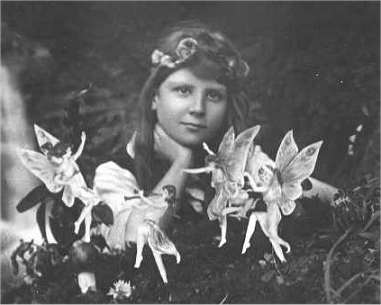 In the popular print and social media I often spot articles about the benefits of keeping an open mind. I also read how it is very important for scientists to keep an open mind. What these articles never discuss is the danger of keeping an open mind. This danger is that you will lose your power to discriminate between sound and fallacious ideas. For example, in 1917 two girls in the village of Cottingley in England took pictures of what appeared to be fairies flying and dancing around them. Among the many people fooled into believing the pictures were real was no other than the creator of Sherlock Holmes, Arthur Conan Doyle. More recent examples are the comedian and trickster extraordinaire, Andy Kaufman, who in 1984 visited a psychic surgeon to treat his cancer (he died), or the actor Dan Aykroyd, of Ghostbusters fame, who believes among other things in mediums and psychics and paranormal phenomena. This is not to say that only non-scientists fall victim to keeping their mind too open. There are many scientists of renown who have ended up accepting ideas or theories that were dubious at best, or patently false at worst. The co-discoverer (along with Darwin) of the theory of evolution, Alfred Russel Wallace, was a believer in psychic phenomena and spiritualism; and led an anti-vaccination campaign. Isaac Newton, the genius behind the laws of gravitation, believed the Bible had a code that predicted the future which he tried to decipher for many years. The Nobel Prize winning physicist William Shockley invented the transistor and revolutionized society, but he also defended theories that proposed the intellectual inferiority of some races. Linus Pauling, a Nobel Prize winning chemist, advocated the use of vitamin C to cure cancer despite the evidence against it. Lynn Margulis, winner of the National Medal of Science, revolutionized the theory of evolution with the concept of endosymbiosis which postulates that mitochondria and chloroplasts originated from bacteria. She also championed several fringe theories, and joined the 911 conspiracy movement that claims that it was a false flag operation to justify the wars in Iraq and Afghanistan. The irony is that Margulis had been married to that great skeptic, the late astronomer Carl Sagan. Kari Mullis won the Nobel Prize for the polymerase chain reaction (PCR), a technique which ushered a revolution in areas ranging from medicine to forensics. Not only is he an AIDs denialist along with Peter Duesberg (see below), but he denies climate change and accepts astrology. It is important to understand that the dangers of keeping an open mind have consequences that go beyond mere public ridicule. When people in positions of eminence are swayed by erroneous ideas, this can have a negative effect on society. Consider the brilliant scientist Peter Duesberg. He performed pioneering work in how viruses can cause cancer, but he was convinced that the HIV virus did not cause AIDS. His advocacy for this idea influenced the South African president Thabo Mbeki who delayed the introduction of anti-AIDS drugs into South Africa leading to hundreds of thousands of preventable deaths. In scientific research keeping an open mind is a quandary that involves navigating between making two types of errors. The first is that a mind that is too closed will reject things as false when they are really true. The second is that a mind that is too open will accept things as true when they are really false. The intuitive way to deal with this quandary is to try to strike a balance between the extremes. However, this is not how most scientists approach the issue. Science tends to be conservative in that it gives more importance to what has already been proven. Scientists view with skepticism those trying to subvert established science. The bar is set very high for the acceptance of new ideas. Most scientists view rejecting something as false when it’s really true as a lesser evil compared to accepting something as true when it’s really false. In the end, however, it will be the evidence and its reproducibility which will make the difference.  On the other hand, in the pseudosciences and the paranormal, the advice of keeping an open mind is often dispensed by those advocating for the existence of psychic phenomena, extrasensory perception, demonic possession, ghosts, telepathy, alien abductions, clairvoyance, mediums, astrology, witches, reincarnation, telekinesis, telepathy, faith healing, and many other fantastical claims. I want to suggest that, as a first step, the safest frame of mind when considering these claims is to vanish the open mind, and assume that the persons making the extraordinary claims are at best deluding themselves, and at worst liars and cheats. This suggestion may scandalize many people, and may come across as an incredibly narrow-minded and unfair approach to investigating anything. How can you find if something is true if you are prejudiced against the possibility that it’s true? The answer is that in this fringe you are dealing with events that, in principle, run counter to well-established scientific laws, or against mountains of evidence. In other words, you are dealing with the impossible. By definition the impossible is not possible and should be treated as such. When considering these claims, if you keep an open mind, you have often lost the battle. This painful lesson has been learned by many scientists that investigated fantastical claims with an open mind just to be fooled by tricks so basic that they would make seasoned magicians roll their eyes (incidentally, this is also why it is always advisable to have a magician as a consultant when investigating these claims). Scientists are the worst possible individuals to rely upon when attempting the investigation of fantastical claims. Scientists are trained to deal with nature, and nature operates based on a fixed set of rules. Natural phenomena don’t change to prevent you from studying them. Nature doesn’t cheat, lie, or delude itself. An open mind is justified only when studying natural phenomena. An open mind in any other setting is a liability. Once you have ruled out trickery and self-delusion and stablished that what you are studying is indeed a natural phenomenon, then you can consider opening your mind to the possibility that it is true. Individuals ranging from common folk to Nobel Prize winners should always remember that if you keep your mind too open, people will dump a lot of trash in it. The image is a scan of the original Cottingley Fairy pictures and is in the public domain in the United States. The open mind image by ElisaRiva is used here under a CC0 1.0 Universal (CC0 1.0) license.
0 Comments
Your comment will be posted after it is approved.
Leave a Reply. |
Details
Categories
All
Archives
June 2024
|
 RSS Feed
RSS Feed